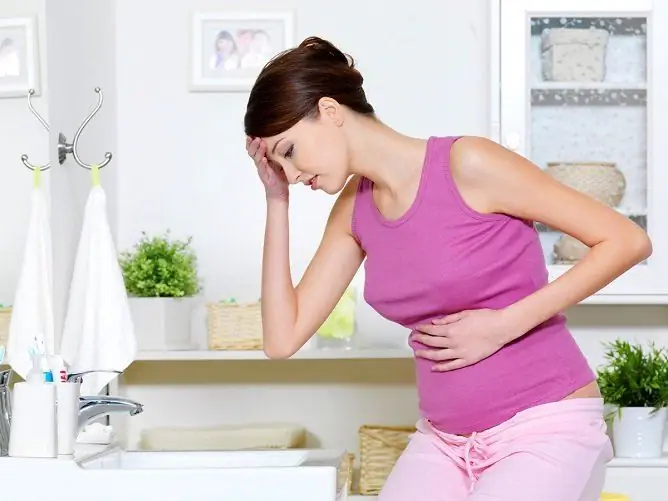- Author Rachel Wainwright wainwright@abchealthonline.com.
- Public 2023-12-15 07:39.
- Last modified 2025-11-02 20:14.
Constipation during pregnancy
The content of the article:
- Causes and risk factors
- Forms of the disease
- Disease stages
- Symptoms of constipation in pregnant women
- Diagnosis of constipation during pregnancy
- Constipation during pregnancy
- Complications of constipation during pregnancy
- Prevention
Constipation during pregnancy is a violation of the bowel emptying function, polyetiological syndrome, characterized by a prolonged delay in bowel movements, difficult or systematically incomplete bowel movement.
At the heart of constipation are violations of the motility of the colon (dyskinesia), the normal functioning of the rectum, the muscles of the pelvic floor, the anal sphincter, and the abdominal wall is of great importance in the mechanism of bowel emptying.

Source: stop-hemorroides.com
The normal frequency of bowel movements is individual: in adults, it ranges from two times a day to three times a week. Constipation is reported when you have a bowel movement two or less times a week. However, only the rarity of bowel movements cannot be a sufficient criterion for the presence of constipation. Constipation is not an independent disease, but a complex of symptoms associated with impaired bowel emptying. Objective criteria for constipation, in addition to reducing the usual frequency of bowel movements, are also considered the presence of difficulties in emptying the intestines, the release of a small amount of feces, and the compaction of its consistency.
Constipation is a common gastroenterological problem during pregnancy, affecting 40% of women. The prevalence of constipation during pregnancy is due to physiological changes in the digestive system during the gestational period. Most often, constipation in pregnant women occurs during the period from 17 to 36 weeks of gestation.
Causes and risk factors
The main cause of constipation during pregnancy is the physiological changes that occur in the body during this period:
- increased concentration of progesterone. Progesterone suppresses the muscle tone of the uterus, while its effect extends to all smooth muscles and leads to a decrease in the motor activity of the intestine, a violation of its evacuation function. The concentration of progesterone and its metabolites in the blood increases by the end of the second trimester and remains stably high until childbirth, having a relaxing effect on smooth muscle tissue. Reducing the tone of the muscles of the uterus, it also relaxes the muscles of the large intestine, activates regulatory peptides and inhibitory substances involved in the regulation of the gastrointestinal tract;
- increased blood circulation in the vessels of the abdominal cavity. It leads to the development of edema of the rectal tissue;
- insufficient intake of vegetables and fruits rich in fiber - fiber is necessary for the normal movement of the food bolus through the digestive tract;
- toxicosis is a common cause of constipation during early pregnancy. Nausea reduces appetite and leads to the formation of an insufficient volume of feces, vomiting causes dehydration;
- insufficient fluid intake (many women reduce the amount of water consumed during pregnancy to reduce swelling);
- side effects of some drugs (iron and calcium-containing drugs used to prevent anemia, antispasmodics for the treatment of toxicosis and threats of termination of pregnancy);
- decreased susceptibility of the intestinal musculature to physiological stimuli. The weakening of the automatic rhythmic bowel movements in pregnant women is biologically justified: with a common innervation with the uterus, increased peristalsis could provoke its contractile activity;
- allergic, autoimmune processes;
- psychological factors, the development of tension (during pregnancy, some women are subject to stress, unreasonable fears);
- general hypodynamia (low physical activity, sedentary lifestyle).
In addition to this, hormonal and anatomical changes occur at a later date (from week 16 to delivery). Constipation during late pregnancy may be due to:
- mechanical compression of the stomach. In the second half of pregnancy, the uterus, which gradually increases in size, squeezes the intestines, making it difficult for the passage of feces. In this case, blood circulation is disturbed, venous stasis occurs in the vessels of the small pelvis;
- a decrease in the level of the polypeptide hormone motilin (occurs during the period from the 16th to the 36th week of gestation), which is responsible for increasing the motor activity of the digestive tract;
- squeezing the intestines when changing the position of the fetus and lowering the child's head into the pelvis.
Forms of the disease
According to the peculiarities of transit and evacuation of feces, constipation during pregnancy can be:
- cologenic - characterized by the slow movement of the contents through the colon;
- proctogenic - associated with dysfunction of the rectum and (or) the anal sphincter, are distinguished by violations of the evacuation of feces and the act of defecation.
By the nature of the flow, two forms of constipation are distinguished:
- acute - is a consequence of a slowdown in the capacity of the large intestine. The disease has an episodic, transient nature, its occurrence is often associated with a stressful situation, a change in nutritional conditions, a trip;
- chronic constipation - they talk about it if, for three or more months, the act of defecation is carried out less frequently than three times a week, or there are difficulties during defecation with the release of a mass of intestinal contents less than 35 g per day, bowel emptying is impossible without taking laxatives, enema or manual assistance.
By the nature of the chair:
- constipation - stool retention occurs for two days or more, often the emptying of the intestines is insufficient, feces can have a different consistency;
- constipation - self-emptying is difficult, feces have a hard consistency.
Disease stages
During constipation, there are three stages:
- Compensated. Defecation occurs once every 2-3 days, flatulence, abdominal pain. Symptoms can be resolved by following a diet.
- Subcompensated. Stool 1 time per 3-5 days, painful bowel movements, extraintestinal manifestations of constipation. Intestinal cleansing occurs after applying an integrated approach without prescribing drug therapy.
- Decompensated. Stool retention up to 10 days or more. Colon cleansing is impossible without the use of enemas and medicines.
Symptoms of constipation in pregnant women
The symptoms of constipation depend on the nature of the causes of the pathology. The main symptoms are:
- a decrease in the frequency of evacuation of contents from the intestine, difficulty in emptying the intestines, defecation is difficult;
- separation during defecation of a small amount of feces (fecal mass is less than 35 g / day for three days or more);
- change in the consistency of feces, separation of high density feces, which injures the anus;
- defragmentation of the stool;
- pain and discomfort in the abdomen (usually on the left) of a pulling character. Sometimes painful sensations appear in the anorectal region, may be accompanied by itching in the anal area or burning sensation in the rectum;
- a feeling of incomplete bowel movement (the so-called muscle constipation), emptying occurs in several stages;
- flatulence;
- the need to strain the muscles during the act of defecation;
- a feeling of blockage in the anorectal region during pushing;
- visual identification of blood streaks on the surface of feces due to tears of the mucous membrane of the anal canal;
- weakness, nausea, decreased appetite, bitterness in the mouth, lethargy, fatigue.
In the chronic course of the disease in pregnant women, a depressed state, irritability, fixation on the activity of the intestines, and suspiciousness are noted.
Diagnosis of constipation during pregnancy
Based on the complaints of the pregnant woman, an initial examination and collection of an anamnesis of the disease, palpation of the abdomen, if necessary, examination of the perianal region, digital examination of the rectum, assessment of the contractility of the anal sphincter, the nature of feces, take place. To assess the transit time of the contents through the digestive tract, a hydrogen breath test is performed.

Source: mamuli.club
Laboratory research methods to exclude possible diseases that cause secondary constipation:
- general blood analysis;
- general urine analysis;
- analysis of feces for dysbiosis;
- swab for flora and antibiotic sensitivity;
- immunological test;
- coprogram.
If you suspect a disease of the digestive tract, an instrumental examination may be required:
- sigmoidoscopy - allows you to assess the condition of the rectum and its mucous membrane, to identify the presence of hemorrhoids and cracks;
- colonoscopy - detects the presence of mechanical obstructions, is performed only in the early stages of pregnancy and in case of urgent need.
Additional instrumental methods (endoscopy, magnetic resonance imaging) can be prescribed only on strict indications.
X-rays are contraindicated during pregnancy.
Constipation during pregnancy
Pregnant women are not recommended to take laxative drugs; they are prescribed by a doctor only if absolutely necessary. In the treatment of constipation during pregnancy, an integrated approach is used, consisting in correcting nutrition, increasing motor activity, and performing massage.
Diet recommendations:
- a day you need to consume a sufficient amount of liquid, to stimulate intestinal motility on an empty stomach, drink a glass of cold water with the addition of a spoonful of honey;
- meals should be fractional - at least 5 times a day in small portions, with equal intervals between meals;
- food that is difficult to digest is best consumed in the morning;
- dinner should be digestible and not abundant;
- increase the amount of fiber in the diet, including food bran, vegetables and fruits, fermented milk products, unrefined cereals, seaweed, vegetable fats, dried fruits;
- products that have a strengthening effect and contribute to the increased formation of gases in the intestines (leguminous grapes, baked goods) are excluded, the use of strong tea, coffee, chocolate, cocoa, white bread, semolina porridge, blueberries, carbonated drinks is limited.
Do not take a horizontal position immediately after eating.
For bloating, it is recommended to take infusions of prunes, mint leaves, chamomile flowers, cumin seeds, dill, and activated carbon is allowed.
With the ineffectiveness of diet therapy, drugs in the form of suppositories that are allowed during pregnancy are first prescribed. For the treatment of constipation during pregnancy, agents with a mild laxative effect and causing stools that are close to normal in consistency are chosen. Laxatives that increase muscle tone and stimulate intestinal motility (senna, castor oil, aloe, preparations in the form of salts, laxatives based on oils) are categorically contraindicated, since these funds can provoke abortion and premature birth.
Complications of constipation during pregnancy
Prolonged constipation can lead to the activation of opportunistic microflora, promote the development of intestinal dysbiosis, and a decrease in immunity. Straining the muscles during bowel movements with constipation can increase the tone of the uterus. In the absence of adequate therapy, prolonged constipation during pregnancy can become a risk factor for the development of purulent-septic complications in the postpartum period.

Prevention
For the prevention of constipation during pregnancy, a diet rich in fiber, increased fluid intake, increased physical activity (light gymnastics, yoga for pregnant women, walking) are recommended.
YouTube video related to the article:

Anna Kozlova Medical journalist About the author
Education: Rostov State Medical University, specialty "General Medicine".
The information is generalized and provided for informational purposes only. At the first sign of illness, see your doctor. Self-medication is hazardous to health!






